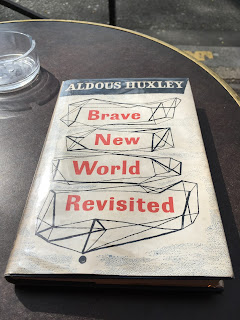Book Reviews 2018 - #1 Brave New World Revisited
On the train
to Paris – a rare treat – I settled into the latest RSA Journal.
I was especially caught by the article ‘Democracy Distracted’ from James
Williams, a man previously unknown to me but who, according to the by-line,
is ‘a design ethicist at the University of Oxford, a former Google strategist,
a co-founder of Time Well Spent, and winner of the inaugural Nine Dots Prize’.
I am not
sure what a design ethicist is, and have never heard of either Time Well Spent
or the Nine Dots Prize. And, naturally,
I have resisted the temptation to use Google to find out, just in case that
was/is his strategy.
But his
article was fantastic; and all the more powerful in light of the Cambridge
Analytica revelations. He writes:
“The
proliferation of ubiquitous, portable and connected general-purpose computers
has enabled this infrastructure of industrialised persuasion to circumvent all
other societal systems and open a door directly into our attentional faculties
on which it now operates for over a third of our waking lives. In the hands of a few dozen people now lies
the power to shape the attentional habits – the lives – of billions of human
beings. This is not a situation in
which the essential political problem involves the management or censorship of
speech; the total effect of these systems on our lives is not analogous to that
of past communications media. The effect
is much closer to that of a religion: it involves the installation of a
worldview, the habituation into certain practices and values, the appeals to
tribalistic impulses, the hypnotic abdication of reason and will, and the faith
on omnipresent and seemingly omniscient forces that we trust, without a sliver
of verification, to be on our side.”
This is a
bit of a heavy read – and is also a bit heavy – but is helpfully summarised
(or, perhaps, signalled) by the quote with which the article begins:
“In Brave New World Revisited, Aldous Huxley
lamented that the defenders of freedom of his time had ‘failed to take into
account… man’s almost infinite appetite for distractions’. In the design of
digital technology, we are making the same mistake.”
In short,
our capacity for distraction may be the fracture that, rather than letting
in the light, opens the path to dystopia.
As the train
hurtled at 300km/h through the French countryside, this seemed apposite: I was,
after all, on my way to a conference
about the ‘Great
Transition’, a phrase which refers to a shift from the current ‘world system’
to a ‘just and sustainable future’. The
Great Transition, though grounded in the technical disciplines of systems
theory, ecological thinking and scenario planning, is essentially a Utopian
thought experiment. It begs important
questions: what kind of world would we like to have; and how might we get
there?
Utopia,
dystopia, big picture thinking in the company of passionate people, and Paris.
This sounds wonderful and is surely enough.
But no! Paris is
also home to the bookshop Shakespeare
& Co. This is somewhere I have
wanted to go for a very, very long time - not least because of my passion for
all things City Lights – and as part
of the treat I had made sure I had enough time to pay the shop a long slow
visit.
And guess
what I found?
A first
edition of Brave New World Revisited
by Aldous Huxley, printed in 1959, 28 years after he wrote Brave New World
and 10 years after the appearance of Orwell’s 1984.
I open it at
random. Page 73. Opening sentence:
“The
survival of democracy depends on the ability of large numbers of people to make
realistic choices in the light of adequate information.”
Well there
we go. Sixty years on and he’s still
bang on the money.
Speaking of
money – well, ahem, these treats can sometimes be a little expensive… Can’t wait to read it though.
Footnote - OK, so now I've read it, and it's fab. Too many possible quotes and extracts, so I'll limit myself to just one - which I think speaks to consumerism in the round (including the argument about consent in Bad Habits), the whole Cambridge Analytica/Facebook thang (informed consent again) and, at least as if not more important, #MeToo (just what is informed consent?):
"It is perfectly possible for a man [or a woman] to be out of prison, and yet not be free... The nature of psychological compulsion is such that those who act under constraint remain under the impression that they are acting on their own initiative... That [s]he is not free is apparent only to other people." p154
"It is perfectly possible for a man [or a woman] to be out of prison, and yet not be free... The nature of psychological compulsion is such that those who act under constraint remain under the impression that they are acting on their own initiative... That [s]he is not free is apparent only to other people." p154



Comments